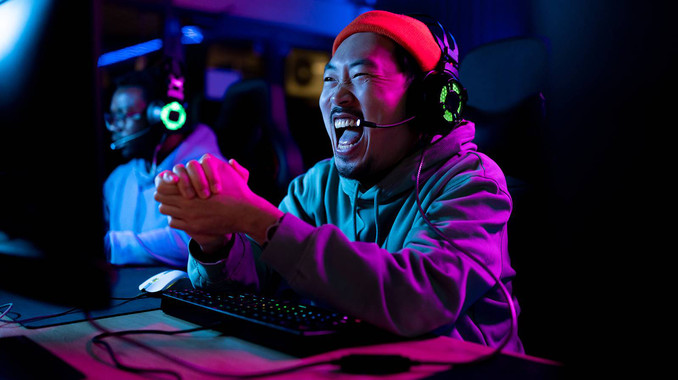The video game “Six Days in Fallujah” was announced in 2009. Some 12 years later, the game still hasn’t been published.
But 2021 could be the year players fight through the bloody 2004 Iraq War battle, and the blowback is already fierce, with some referring to the game as an “Arab murder simulator. “By mid-May, a Change.org petition had more than 16,500 signatures calling for the game’s release to be canceled.
This is both an old and a new story. Video games, and war games in particular, have often caused a backlash. But “Six Days in Fallujah” makes an effort to be as controversial as possible.
“Call of Duty” Controversies
The modern era for war game gunslinging started in 2002 with “Battlefield World War II.” The game sold a modest 680,000 copies in its first four years of release, but it kicked off a 12-game sequence of popular war games. If you’ve ever picked up a controller, you’re probably more familiar with the “Call of Duty” franchise, launched in 2003. The series has 18 games, a few of which have sold more than 30 million copies.
“Call of Duty” started with a World War II campaign, earning a few early rebukes from veterans groups. But publisher Activision Blizzard stoked loud criticism in 2019 with “Call of Duty: Modern Warfare.” The game included a mission built around a bombed-out highway that the Russian army was responsible for, only the mission was very similar to what the U.S. Army did in Iraq in 1991. Activision was pilloried for rewriting history to make Russians look bad.
That’s familiar ground for the franchise, which in 2009 angered the Russians for making them the bad guys in “Call of Duty: Modern Warfare 2.”
It’s a lot easier to make “Halo,” a video game franchise that focuses on killing space aliens.
“Six Days in Fallujah” is Different
Whether it’s a success or a failure, “Six Days in Fallujah” will be hugely important. If it’s a success, game developers will no longer shy away from recent events. If it’s a failure, developers will continue to steer a wide berth around any recent military conflicts.
They don’t have this problem when they’re blowing up Nazis.
The only thing that blew up in 2009 was Atomic, the company that developed “Six Days in Fallujah.” Konami pulled out of a partnership to release the game, and Atomic quickly folded. But Atomic CEO Peter Tamte started a new company, Victura, and now he’s making a renewed push to release the game in 2021.
Tamte describes it as a choose-your-own-adventure horror game. But not like anything you’ve seen before.
The city of Fallujah was a hotspot during the Iraq War. Terrorist Abu Musab al-Zarqawi served as a magnet to anti-U.S. fighters from around the region; the violence in Fallujah caused thousands of civilian casualties. Western forces twice tried to retake Fallujah in 2004. The second battle cost about 100 American soldiers’ lives.
Tamte said he interviewed dozens of Marines to make the game, but he’s keen to point out he also interviewed dozens of Iraqi citizens. Players participate in a stealth mission where they are an Iraqi caught between Al Qaeda and American forces. The point of the game is not to shoot everything that moves but rather force players to face deliberate, sometimes dark choices. The goal is for the game to be like the very real choices faced by real people in 2004.
“The concern has always been, how do we tell these stories faithfully, but not sensationally?” Tamte told GamesBeat. “There was never a question in my mind as to whether or not we should do it or whether a video game should tackle it. I never hesitated about that. For right or for wrong, to be honest with you, maybe I should have.”
“We have different kinds of scenarios, and we handle them differently from what Call of Duty would do,” he continued. “Call of Duty is still about kill count, and for us, it’s very much about giving players – part of establishing empathy in players about what it’s like is discretion about whether they’re supposed to fire or not, and how they’re supposed to handle situations.”
Part Documentary, All Controversy
“Six Days in Fallujah” might be a different kind of video game, with documentary interviews interspersed with game footage to give players more education than you get blowing up zombie Nazis, which is an actual thing you can do in some “Call of Duty” games.
In a sense, making Al Qaeda the bad guy is an easy call for Tamte. The violent sect isn’t beloved by much of anybody.
But if “Six Days in Fallujah” is a hit, what’s to say Tamte won’t come back with “September 11: The Video Game” or any number of storylines based on real events?
The real events leading up to the Battle of Fallujah could include President George W. Bush’s laughable premise of searching for weapons of mass destruction. The game could talk about why the U.S. was even there in the first place. It does not.
Instead, Tamte said, the big question is whether gamers are ready to get real.
“The only thing that I fear is that fundamentally when we cut through everything, people’s objection here to Six Days in Fallujah is more of an objection to the Iraq War,” Tamte said in an interview with Polygon. “We’ve made games about other wars and real stories from other wars that have not gotten the attention and have not gotten any sort of controversy. So fundamentally, people’s objection is to the Iraq War. I don’t think we should be a proxy for that particular battle.”
Gamers can decide for themselves if Tamte is successful in finally releasing the war game this year. Or maybe in another 12 years, we’ll still be fighting this battle in the video game wars.
![]()





